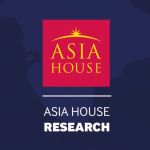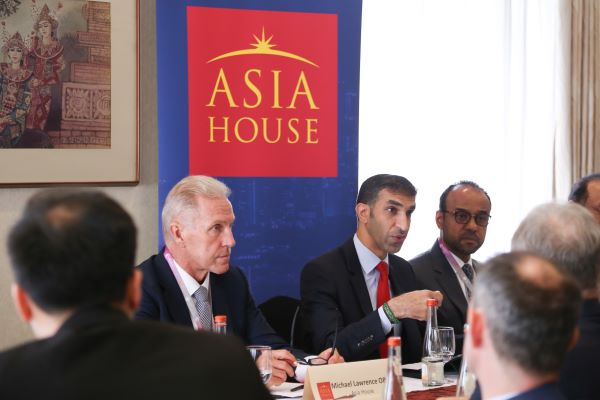Driving commercial and political engagement between Asia, the Middle East and Europe
Driving commercial and political engagement between Asia, the Middle East and Europe
Driving commercial and political engagement between Asia, the Middle East and Europe
 Following the inaugural summit held between the Association of Southeast Asian Nations (ASEAN) and the Gulf Cooperation Council (GCC) in Riyadh, Saudi Arabia, Asia House Research examines the outcomes of the summit and highlights the implications for trade between the two regions in the context of increasingly complex international trade and political relationships with the US, China and other major economies.
Following the inaugural summit held between the Association of Southeast Asian Nations (ASEAN) and the Gulf Cooperation Council (GCC) in Riyadh, Saudi Arabia, Asia House Research examines the outcomes of the summit and highlights the implications for trade between the two regions in the context of increasingly complex international trade and political relationships with the US, China and other major economies.
Key Takeaways
The first ASEAN-GCC Summit was held in Riyadh, Saudi Arabia, on Friday 20 October and was co-chaired by Indonesian President Joko ‘Jokowi’ Widodo and Saudi’s Crown Prince Mohammed bin Salman (MBS). A joint statement from the summit announced the establishment of a mechanism for coordination and dialogue – the ASEAN-GCC Framework of Cooperation (2024-2028) – and marks a new era in the two blocs’ growing cooperation.
The 42-point joint statement outlined a wide range of issues on which the blocs could “upgrade and develop” their relationship, including:
In addition to the two largest economies from each region, the summit was attended by leaders and senior officials from most of the member countries in both blocs. They included the King of Bahrain, the Sultan of Brunei, the Emir of Qatar, the presidents of The Philippines, Timor Leste, and the UAE, the Crown Prince of Kuwait, the prime ministers of Cambodia, Laos, Malaysia, Singapore, Thailand and Vietnam, the Deputy Prime Minister of Oman and the secretaries general of ASEAN and the GCC. It is significant that the inaugural summit was chaired by the leaders of the two largest economies from the respective blocs.
Indonesia, which gained international recognition for successfully chairing the G20 group of countries in 2022, followed by a confident chairing of ASEAN in 2023, is on a trajectory to play an increasing role in international affairs after steadily increasing its regional role since the turn of the century[1].
Equally, Saudi Arabia has enhanced its leadership position within the GCC under MBS and through his “Vision 2030” plan for the Kingdom.
One notable outcome has been the proposal by Malaysian Prime Minister Anwar Ibrahim that the two blocs begin negotiations for an FTA. While a comprehensive FTA combining all current 16 member states of both blocs could provide a significant additional boost to trade between the two regions, more focused or individual country bilateral trade deals are likely to make faster progress in the short-term.
There were no binding agreements signed at the summit, but the ambitious joint statement suggests a willingness to accelerate ties between the two blocs which have been building over the last five+ years, as highlighted in the Asia House Middle East Pivot to Asia research.
Geopolitical Implications
As both regions increasingly look beyond traditional allies, the ASEAN-GCC Summit offers an opportunity to diversify geopolitical linkages. A major consideration of both ASEAN and the GCC is increasing geopolitical tensions, most notably between China and the US.
The economies in both regions have very strong economic relations with China. GCC countries have seen a significant growth in economic relations with China in recent years, and China has been the biggest trading partner for most of the ASEAN member states for some time. As the GCC and ASEAN strengthen bilateral economic ties, it may create a conducive environment for co-investment initiatives between China and the Gulf, leveraging the economic opportunities stemming from the growing cooperation between the two regions.
At the same time, the US continues to play a critical political and economic role in both regions. Singapore has been particularly vocal about the importance of maintaining a broadly open international economy and not allowing China-US tensions upend decades of economic growth.
For China, since the main drivers of ASEAN-GCC engagement revolve around trade, investment, and oil supplies, it is unlikely to cause significant concerns in Beijing. However, China will undoubtedly monitor this emerging dynamic, paying close attention to areas that intersect with its interests, particularly in those that may have geopolitical implications. While the final joint statement from the summit mentions a commitment to maritime safety and security, freedom of navigation and resolution of disputes via the UN Convention on the Law of the Sea (UNCLOS), which is a critical element of the territorial disputes between China and a number of ASEAN member states, it simply reflects the existing positions of the individual parties and stresses peaceful resolutions, in which case it is unlikely to exacerbate any existing tensions.
In the GCC, China’s expanding economic footprint and reliance on the Gulf for energy supplies has led Beijing to take a more active political role in the region. This engagement aims primarily at ensuring the stability of its energy supplies. However, Beijing is acutely aware of the complex regional dynamics that could undermine its interests, adopting a cautious and balanced approach to the region. The Israel-Palestinian conflict, which was the subject of a second communique from the summit, clearly makes engagement with the region even more complex.
Meanwhile, ASEAN is a top priority for China’s neighbourhood diplomacy due to geographical proximity and economic interdependence. In 2022, ASEAN became China’s largest trading partner, surpassing both the US and the EU. Although China has always viewed the region through the prism of China-US competition, wary of any closer engagement between ASEAN member states and Washington, the ASEAN-GCC Summit should elicit a neutral response from Beijing.
Inter-regional economic and political cooperation
The establishment of a formal inter-regional engagement mechanism follows growing economic ties more broadly between the two regions. In 2022 Gulf-ASEAN trade grew by 44 per cent on the previous year to US$138bn. While this is dwarfed by the total trade that each region has with China and the OECD markets, this fast growth in inter-regional trade indicates a measurable shift in traditional economic relations, highlighting the global trend of growing links between non-OECD markets.
Areas of further cooperation between ASEAN and GCC
The Summit’s co-chair Saudi Arabia signed the Treaty of Amity and Cooperation with ASEAN countries earlier this year, while the UAE, a Sectoral Dialogue Partner of ASEAN, actively participated in the ASEAN Summit activities in September. The UAE’s participation not only granted a platform for further collaboration, but also positioned the country to potentially influence discussions on topics of mutual interest, a privilege that is currently not yet extended to the rest of the GCC members. Thus, the ASEAN-GCC Summit serves as a catalyst for other GCC countries, including Oman, Bahrain and Kuwait, to increasingly foster economic and commercial engagement with ASEAN. In the same vein, the Summit offers an opportunity for ASEAN nations that previously have had little engagement with the Gulf, such as Cambodia and Laos, to establish their presence amid the growing connectivity with the GCC bloc.

HE Dr. Thani Al Zeyoudi, UAE Minister of State for Foreign Trade (centre), at an Asia House corporate members’ briefing in the sidelines of the ASEAN Business and Investment Sumit in Jakarta, September 2023
Digital economy and clean energy are two of the key areas for further cooperation as evidenced by the Joint Statement from the ASEAN-GCC Summit and the ASEAN-GCC Framework of Cooperation for the period of 2024-2028.
Serving as a roadmap for the ASEAN-GCC partnership, both documents provide a structured and strategic approach to collaboration, which may result in greater gains for the two blocs. For instance, enhanced coordination between the ASEAN Business and Advisory Council (ASEAN-BAC) and the Federation of the GCC Chambers underscored in the framework can help to identify and explore new economic opportunities, while contributing to greater economic diversification in both blocs.
Conclusion
The first ASEAN-GCC Summit and the new framework for cooperation illustrates the growing ties between the two blocs and an ambition to accelerate trade and investment. While short on specific, binding agreements, the tone of the communique suggests broad buy-in from the member states and a willingness to drive deals. The number of heads of states and senior officials who attended the summit reflected the importance placed on the dialogue and suggests a willingness to establish more formal agreements. The potential for a region-to-region FTA is likely to be a catalyst for an acceleration of dialogue in this area. However, individual member states from each side are likely to pursue their own trade deals and other agreements with trading partners on a bilateral basis. Unlike the BRICS grouping, which now includes Saudi Arabia and the UAE, any formal agreements under the ASEAN-GCC are unlikely to seek to actively drive geopolitical changes, but may provide a useful forum to raise the interests of fast-growing middle-income countries.
The summit agreed to convene every two years. The next meeting will take place in Malaysia in 2025.
[1] ASEAN has established its Economic Community and been the key element of the Regional Comprehensive Economic Partnership, a major East Asian multilateral trade deal centred on ASEAN.
Asia House will explore Gulf-ASEAN economic connectivity in greater detail when it publishes its 2023 Middle East Pivot to Asia report in December 2023. These issues were also explored in last year’s report which can be read here: https://asiahouse.org/research_posts/the-middle-east-pivot-to-asia-2022/
Asia House provides a range of services to help organisations navigate complexities in Asia and the Middle East. For more information please contact Charlie Humphreys, Director of Corporate Affairs: charlie.humphreys@asiahouse.co.uk
